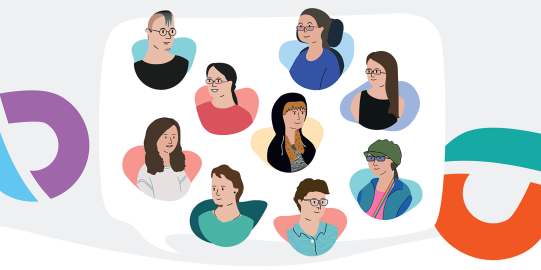There is a lot of space between being nonspeaking and being able to consistently meet all of our communication needs using socially expected amounts of speech. Many autistic people, including me, live in that space and use AAC to communicate at least some of the time. Sometimes, it is useful to be able to describe how we fit in that space between nonspeaking and fully speaking. Our speech and language experiences can affect what AAC options make the most sense to support our needs. A precise description of our challenges and their effects can also help us advocate for those supports — and even get AAC devices funded!
Intermittent, unreliable, insufficient, and expensive speech help describe the space between nonspeaking and fully speaking.
Intermittent speech
With intermittent speech, an autistic person can speak some of the time but not all of the time. Maybe they’re out of energy, overloaded, or sick. Certain environments can be harder to speak in than others. For whatever reason, a person can sometimes speak, but not always. I find presentations to be a situation where I’m more likely to be able to speak. I’ve only had one conference presentation where I couldn’t speak so far — but after the session gets out is another matter!
Unreliable speech
With unreliable speech, words come out that don’t match what we want to say. We could accidentally land on a script — a repeated word, phrase, or even longer chunk of language —that matches what was said to us but not our current situation. For example, when someone asks, “How are you?” it’s easy to answer, “I’m fine, thanks, and you?” But if that automatic response comes out while waiting to be seen in the emergency room, it’s a problem!
Other examples of unreliable speech can include verbal tics, in which a person makes sounds (possibly words) that aren’t entirely voluntary, repeating the last answer of a multiple-choice question, or word substitutions that change the meaning of what we say.
Insufficient speech
When autistic people experience insufficient speech, we can say some things, and those things are true. They might even be related to what we want to say. But there are so many other things we can’t say. We might be able to speak using scripts, but we can be more specific if we use AAC. For example, one might be able to use spoken language to say, “Houston, we have a problem,” but specify “I need help” with AAC. The script fits the situation. It’s certainly not wrong. But there is more imprecision and more space for misunderstandings with “Houston, we have a problem” than with “I need help!” It’s insufficient.
Expensive speech
With expensive speech, speech is tiring! Speaking requires us to coordinate very complicated movements, and even if it’s mostly automatic, it can take a lot of energy, focus, or any other kind of internal resource we might have. Maybe we can use speech to order in a cafe, but speech is expensive, so we use AAC instead and save that energy for later. I’ve been working on switching to AAC earlier and more often for this reason.
Connections between the types of speech
Sometimes, these experiences are connected. They can happen together, or one can lead to another.
For example, I have expensive speech. After I’ve taught a class or given a presentation, I’ve used a lot of speech! That takes a lot of energy, and then I’ll be tired. This can make it harder to say everything I want with speech — it becomes insufficient. When I met with a supervisor about my research after I had already taught that day, I could usually make all the socially appropriate greetings. I could give a scripted, accurate explanation of what I had done in the last week. But when she had a question and wanted more details about my methods, I couldn’t answer that orally. I could still type or write the answer, so I pulled out my iPad, opened Flip Writer, and went to the whiteboard in her office. Expensive speech had led to insufficient speech.
After the meeting, I was all done with mouth words for the day. Continuing to use my expensive speech after it had already led to insufficient speech meant I ran out of speech entirely, and my intermittent speech became apparent.
Other people have different connections between these experiences. I have very little unreliable speech, mostly connected to scripts, and I’ve been able to address it with alternative scripts. In the emergency room or doctor’s office example, I have the answer “I’m fine, except for the reason I’m here” instead of “I’m fine, thanks, and you?” Because I have very little unreliable speech and I’ve found ways around most of it, I don’t have strong connections between unreliable speech and intermittent, insufficient, or expensive speech. People who experience more unreliable speech might notice connections between it and other aspects of their communication experiences.
Do you or someone you know experience any of these types of speech? Try AAC!
Resources
Donaldson, Amy L., endever corbin, Alyssa Hillary Zisk, and Brandon Eddy. “Promotion of communication access, choice, and agency for autistic students.” Language, Speech, and Hearing Services in Schools 54, no. 1 (2023): 140-155. https://doi.org/10.1044/2022_LSHSS-22-00031
Donaldson, Amy L., Alyssa Hillary Zisk, Brandon Eddy, endever corbin, Melissa Ugianskis, Erin Ford, and Olivia Strickland. “Autistic Communication: A Survey of School-Based Professionals.” Perspectives of the ASHA Special Interest Groups 8, no. 6 (2023): 1248-1264. https://doi.org/10.1044/2023_PERSP-23-00107
Donaldson, Amy L., endever corbin, and Jamie McCoy. "Everyone deserves AAC”: Preliminary study of the experiences of speaking autistic adults who use augmentative and alternative communication.” Perspectives of the ASHA Special Interest Groups 6, no. 2 (2021): 315-326. https://doi.org/10.1044/2021_PERSP-20-00220
Koerner, Susan Marjorie, Sarah Glaser, and Kirsten Kropkowski. “Perspectives of part-time augmentative and alternative communication use in adults and implications for pediatric service delivery.” Perspectives of the ASHA Special Interest Groups 8, no. 4 (2023): 747-760. https://doi.org/10.1044/2023_PERSP-22-00200
Zisk, Alyssa Hillary. “Part-time AAC use: What does it mean and why does it matter?” Archived USSAAC webinar (members only). (2024, January 17). https://isaac-online.org/engli...
Zisk, Alyssa Hillary, and Elizabeth Dalton. “Augmentative and alternative communication for speaking autistic adults: Overview and recommendations.” Autism in Adulthood 1, no. 2 (2019): 93-100. https://doi.org/10.1089/aut.2018.0007
If you would like to access any papers mentioned in this reference list that Alyssa Hillary Zisk has written but do not have access to the journals in which they were published, please email support@assistiveware.com.




